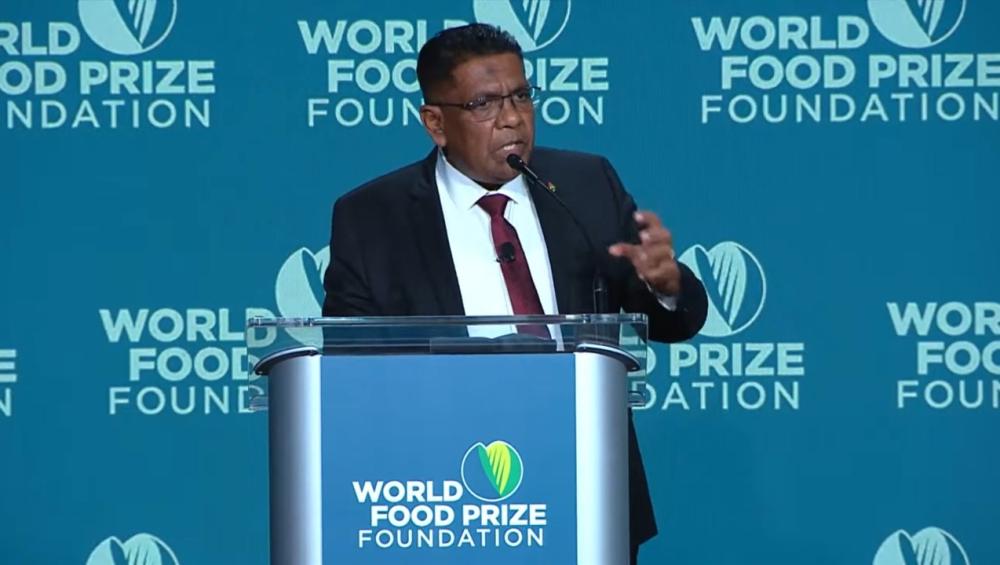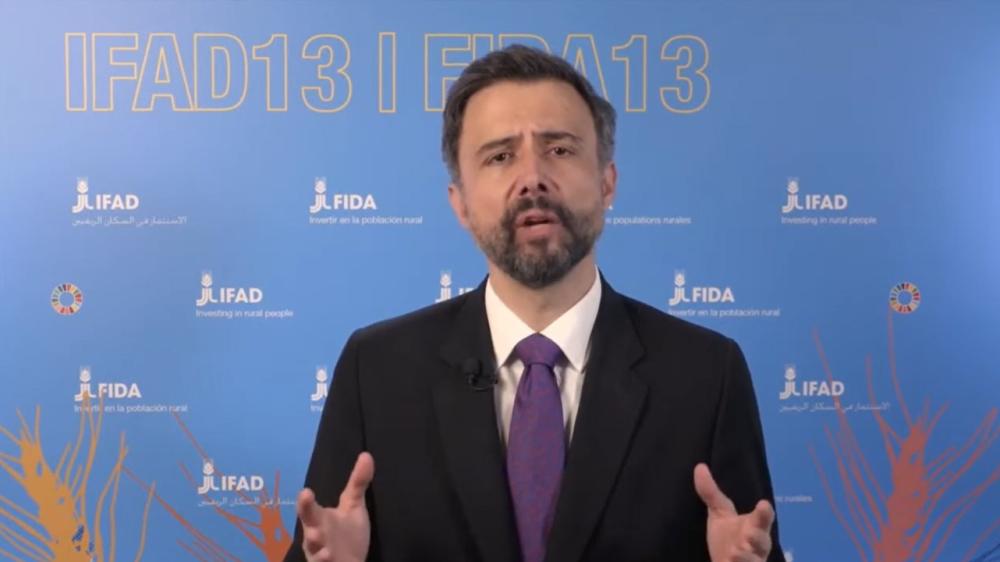At the 2023 Borlaug International Dialogue, IFAD, Guyana, the University of Nebraska and IICA explore ways and solutions whereby agriculture can help tackle the water crisis

Des Moines, Iowa, October 30, 2023 (IICA). The participants in a high-level panel discussion organized by the Inter-American Institute for Cooperation on Agriculture (IICA) within the framework of the 2023 Borlaug International Dialogue were agreed that agriculture can serve as a tool for helping to solve the water crisis that has hit various countries and regions of the Americas in recent years.
The speakers were Álvaro Lario, President of the International Fund for Agricultural Development (IFAD); Zulfikar Mustapha, Minister of Agriculture of Guyana; Christopher Neale, Director of Research at the University of Nebraska’s Daugherty Water for Food Institute; and Fernando Schwanke, IICA Project Director. Margaret Ziegler, IICA Representative in the United States, introduced the panel members and moderated the discussion.
Each year, in the U.S. state of Iowa, the Borlaug Dialogue brings together global leaders, farmers, academics, scientists, educators and students from a number of countries to discuss ideas and projects aimed at achieving more sustainable, equitable and inclusive agrifood systems.
The event is organized by the World Food Prize (WFP) Foundation, a prestigious institution that promotes innovation and sustainability in food production. The foundation awards the World Food Prize, considered the Nobel Prize in its field, which recognizes individuals who make the most outstanding contributions to global food and nutrition security.
“It goes without saying that water is an essential element for life. It is also a vital issue at the heart of our investment portfolio,” said Álvaro Lario, the head of IFAD, an international financial institution and specialized United Nations agency dedicated to eradicating poverty and hunger in rural areas of developing countries.
Lario pointed out that more than 60% of the world’s population suffers from water insecurity. “Small farmers, women, indigenous peoples, and other vulnerable sectors are disproportionately affected by drought, desertification and soil degradation, problems that make accessing water difficult,” Lario explained.
The President of IFAD gave details of some of the projects that his institution is implementing in Latin American and Caribbean countries to promote access to water. He cited Honduras as a case in point, where small-scale infrastructure such as reservoirs and distribution systems is being built. In Brazil, IFAD is involved in works designed to adapt to shocks and ensure the water supply in rural areas. “We can and must work together to ensure equitable access to water,” he said.

Need to create solutions
Guyana's Minister of Agriculture, Zulfikar Mustapha, stressed that it is imperative that governments and the private sector work on solutions to the water crisis, noting that the problem affects some countries much more than others.
“The relationship between water and agriculture is undeniable. But there is a part of the world that can produce food freely, thanks to the different sources of water it possesses. In other places we see droughts, which lead to poverty and hunger,” he remarked.
Mustapha said Guyana is a country blessed with an abundance of water; its name, in fact, means “Land of Many Waters.” Nonetheless, work is ongoing to ensure water is available during periods of drought, using harvesting and storage systems. He also gave details of projects aimed at improving resilience, such as the development of a new variety of rice whose cultivation requires less water.
“We have the political will to place the issue of water at the heart of our agricultural policies, and we’re demonstrating it with projects that can be replicated in our countries. Water is a precious resource that impacts not only agriculture, but also social inclusion and poverty reduction,” Mustapha observed.
Christopher Neale recounted the experience of the Daugherty Institute, part of the University of Nebraska, which carries out research on the global challenge of achieving food security while reducing the pressure on water sources, through better management in production systems.
“We must focus on the resilience of agriculture, as we have to be prepared for droughts, floods and other increasingly extreme climate events,” Neale commented. He highlighted ways to improve water governance systems and the need to develop accessible technologies so small farmers can achieve better water management.
Schwanke explained the thinking behind IICA’s Hemispheric Water and Agriculture Initiative, which aims to promote ways in which agriculture can make a positive contribution to the water crisis that a large part of the Americas is experiencing, based on the premise that without water there is no agriculture, and without agriculture there is no food security.
The issue is strategically important for IICA, which in recent years has supported member countries with more than 70 technical cooperation actions on water for agriculture, in a context of climate change that, among other extreme events, has generated droughts and caused big losses in some of the world’s most important agrifood-producing and exporting countries, such as Argentina, Brazil, Uruguay and Paraguay.
Last month, representatives of the Inter-American Development Bank (IDB), the World Bank, CAF-Development Bank of Latin America, the Economic Commission for Latin America and the Caribbean (ECLAC) and the Daugherty Institute took part with IICA in the technical launch of the initiative, which aims to build capacities and promote strategic public-private partnerships involving IICA member countries to achieve more efficient integrated water management in agriculture.
“At the request of IICA member countries,” Schwanke pointed out, “after a great deal of thinking about how agriculture can help solve the water crisis, we opted for four main areas of work: production and storage of water through good agricultural practices; efficient water use in agriculture through technological innovation; the strengthening of governance; and the promotion of investments for collection, storage, distribution and irrigation.”
"Agriculture,” he concluded, “must be part of the solution to the water crisis and that is our responsibility."
More information:
Institutional Communication Division.
comunicacion.institucional@iica.int